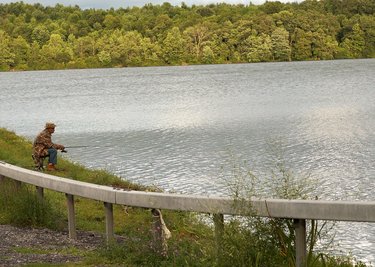Westerlo narrowly extends gas-drilling moratorium
The Enterprise — Marcello Iaia
Councilman Theodore Lounsbury looks pensive during the Westerlo Town Board meeting on July 24, where residents asked him and Councilman Alfred Field to change their votes against a gas-drilling moratorium in Westerlo. Field and Lounsbury didn’t, and the board was deadlocked, 2 to 2. At an emergency meeting, the moratorium passed, 3 to 2.
The Enterprise — Marcello Iaia
Risk and recreation: A fisherman on Monday evening watched the rippled surface of the Basic Creek Reservoir, the largest body of water in Westerlo and a supplement to the Alcove Reservoir in Coeymans, which together serve the city of Albany’s drinking water. Maps of the Basic and Alcove watersheds are included in a report compiled for the Westerlo town board on high-volume hydraulic fracturing. Opponents of the process in Westerlo list contaminated water among their concerns.
WESTERLO — A formerly deadlocked town board extended a moratorium against gas-drilling, 3 to 2, and adjourned a 10-minute meeting on Monday evening.
Councilman Anthony Sherman had sent a letter of support for the first local law of the year during a special board meeting four days earlier, but his vote, unable to be counted without his presence, turned out to be crucial. The board denied the extension, 2 to 2.
In a long discussion afterwards, residents in the gallery asked councilmen Theodore Lounsbury and Alfred Field to change their votes and called for ethics disclosures.
With the year-long moratorium set to expire, an emergency meeting was held on Monday, to pass the law with Sherman present. Lounsbury and Field voted against the law both times.
The law was first passed in 2012, to “temporarily suspend administrative review, approval process and/or drilling activities associated with the production of natural gas on or affecting lands” in Westerlo, and was extended last year.
Because of the controversy surrounding the intensive process of recovering natural gas from underground, known as hydrofracking, and its potential impacts, the law says, the moratorium was intended to give the town board time to evaluate the issue and make changes, if appropriate, to the zoning law.
Nearby towns have similar laws that have been extended while they deliberate over how to address the process. A recent decision by the state’s highest court affirmed the authority of local municipalities to prohibit hydrofracking.
After the deadlocked vote on July 24, zoning board member John Sefcik asked Field and Lounsbury why they voted against the law. Sefcik and his wife, Dianne Sefcik, have been outspoken in their opposition to hydrofracking.
Referring to a research committee the town board had commissioned twice over two years, Lounsbury said, “There’s no reason to do another task and have another committee look at the zoning. We can wait until New York State makes whatever move they make, and at that time we can look at zoning, we can adopt their rules and regulations.”
“New York State has done nothing as far as issuing permits,” Field said, answering Sefcik. “Number two, we’ve had a moratorium for two years, and nothing, absolutely nothing, has been accomplished.”
Field chaired the committee for its initial report but stepped down after the town board asked for a revision.
He told Sefcik the town has more important issues.
“You don’t see our residents sitting at meetings anymore, compared to what there was before the issue came up…They want to see the town move forward,” Field said.
Councilman William Bichteman, who voted for the law, said he saw no downside to the moratorium being in place and expects the bureaucratic process of amending the zoning law to take time.
Lounsbury later said that he isn’t for or against hydrofracking, but feels a property owner should be able to use his or her land as long as they meet state regulations and operate safely.
Dianne Sefcik said during the July 24 meeting that the state’s regulations are weak.
“This is the opinion of many people,” she said.
“No, it’s the opinion of the anti-frackers,” Lounsbury responded. “That’s what the opinion is and that’s what your opinion has always been. You’ve never said anything pro about it and that’s all you’re doing. You’re against it.”
When Sefcik asked Field and Lounsbury whether either of them had ever worked for the petroleum industry, they acknowledged they had but said they didn't see it as relevant.
About 10 people sat in the gallery for both meetings; a few more came for Monday’s meeting.



